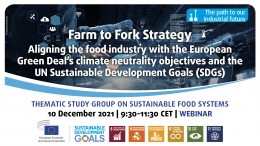European Economic
and Social Committee
Pārtikas nozares ilgtspēja
Mūsu dzīve bez pārtikas nav iedomājama, un pārtika ir neatņemama Eiropas kultūras sastāvdaļa. Tomēr pārtika, ko mēs ēdam, tās ražošanas veidi un izšķērdētās pārtikas daudzums būtiski ietekmē cilvēku veselību, dabas resursus un sabiedrību kopumā:
- neveselīga uztura dēļ cilvēki — it īpaši bērni — arvien vairāk cieš no liekā svara un aptaukošanās;
- lauksaimnieki un darba ņēmēji nesaņem taisnīgu samaksu par savu produkciju;
- visā pārtikas ķēdē tiek zaudēta vai izšķērdēta viena trešdaļa pārtikas;
- vide ir tā, kas cieš: pārtikas ražošana un patēriņš dramatiski ietekmē klimata pārmaiņas, bioloģiskās daudzveidības zudumu, gaisa un ūdens piesārņojumu, augsnes degradāciju utt.
Covid-19 radītā krīze ir modinātājzvans pārmaiņām. Tā ir apliecinājusi, ka pārtikas nogādāšanu “no lauka līdz galdam” nedrīkst uztvert kā pašu par sevi saprotamu, un ir parādījusi tirgus dalībnieku un darbību savstarpējo saistību visā pārtikas sistēmā. Lai nodrošinātu vienādus rezultātus iedzīvotājiem, lauksaimniekiem, darba ņēmējiem un uzņēmumiem, vairāk nekā jebkad agrāk ir vajadzīgas taisnīgas, resursefektīvas, iekļaujošas un ilgtspējīgas piegādes ķēdes visā lauksaimniecības un pārtikas sektorā.
Jau gadiem ilgi EESK ir bijusi avangardā, aicinot īstenot ilgtspējīgu un visaptverošu pārtikas politiku. Šāda integrēta un sistēmiska pieeja ir būtiska, lai risinātu daudzās un savstarpēji saistītās problēmas, kas ietekmē pārtikas sistēmas, kā arī lai nodrošinātu ekonomikas, vides, sociālās jomas un kultūras ilgtspēju un lai garantētu politikas jomu (piem., lauksaimniecības, vides aizsardzības, veselības, izglītības, tirdzniecības, ekonomikas, tehnoloģiju u. c.) integrēšanu un saskaņošanu, un lai sekmētu sadarbību dažādos pārvaldības līmeņos.





